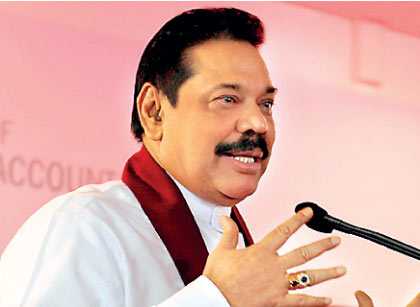Monday Feb 23, 2026
Monday Feb 23, 2026
Monday, 7 September 2020 01:29 - - {{hitsCtrl.values.hits}}

Prime Minister and Finance Minister Mahinda Rajapaksa

Finance Ministry Secretary S.R. Attygalle
By Chandani Kirinde
The Finance Ministry has issued strict guidelines to State institutions for preparation of their Budget for 2021, putting curbs on funding for new or stalled projects, maintenance of project offices and staff, and imposing a ban on construction of new buildings for government institutions for the next two years.
Finance Ministry Secretary S.R. Attygalle issued a circular last week detailing the guidelines for the preparation for the Budget estimates for 2021 as well as budgetary forecast for 2022-23 to all secretaries of ministers and State ministries, chief secretaries of provincial councils, heads of department and statutory bodies.
The Finance Ministry said that even though the COVID-19 situation in the country has been brought under control, it is vital that the economic fallout caused by it is minimised, and hence there has to be strict control over public finances with cutbacks of unnecessary expenditure and effective management of Government finances with the Budget estimates prepared in keeping according to strict fiscal discipline.
Government institutions have been instructed to review all projects that are stalled or have just started, as well as projects which started with foreign funding but must rely on money from the Treasury to complete its work. If such projects are to continue, the institutions will have to get special Cabinet approval and only then forward the request to cover such projects to the Treasury.
No funds will be allocated for the maintenance of projects offices or their staff unless Cabinet approval is obtained. In case of projects for which agreement have been signed but no work has started, the commitment fee that is being paid is to be stopped and such agreements cancelled.
The Finance Ministry said that no funds will be allocated for any new projects within the next three years unless they come within the policy framework of the Government.
There will also be no budgetary allocation for Project Management Units (PMUs), hence estimates for their upkeep should not be included in the Budget estimates, the circular said.
Construction of new buildings for Government institutions has been stopped for the next two years. In instances where the bulk of the work is complete, the Treasury will release funds to finalise such projects.
With regards to recurrent expenditure, the Finance Ministry has noted that while the Consolidated Fund gives a substantial amount of funds for the welfare of State sector workers, there is information that the monies are not disbursed methodically for those who need such assistance, and in some cases, there is duplication of payments with Provincial Councils. The head of institutions has been directed to properly identify those who need such assistance.
The Finance Ministry has also instructed government institutions which have investments, such as fixed deposits, Treasury bills, etc., to utilise the income from those for their urgent financial needs instead of seeking money from the Treasury.
The institutional heads have been asked to submit their Budget estimates for 2021 and 2022-23 forecast by 15 September.
In preparing the Budget estimates, heads of institutions have been directed to focus on priority areas identified by the Government, such as rural economy, housing, education reforms, vocational training, infrastructure, rural roads, and small and medium enterprises (SME) development.
The Finance Ministry Secretary said all these programs are in keeping with the Government policy of providing prompt relief to the public, and instructed that all rural and regional offices be strengthened for the successful implementation of these policies.
The Government will present its 2021 Budget to Parliament in November.